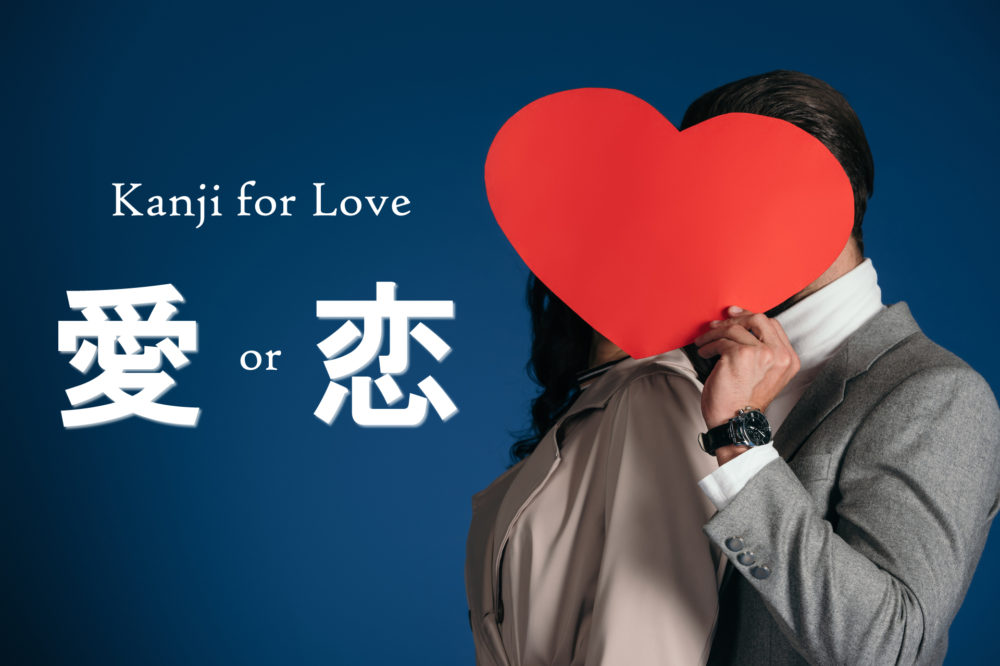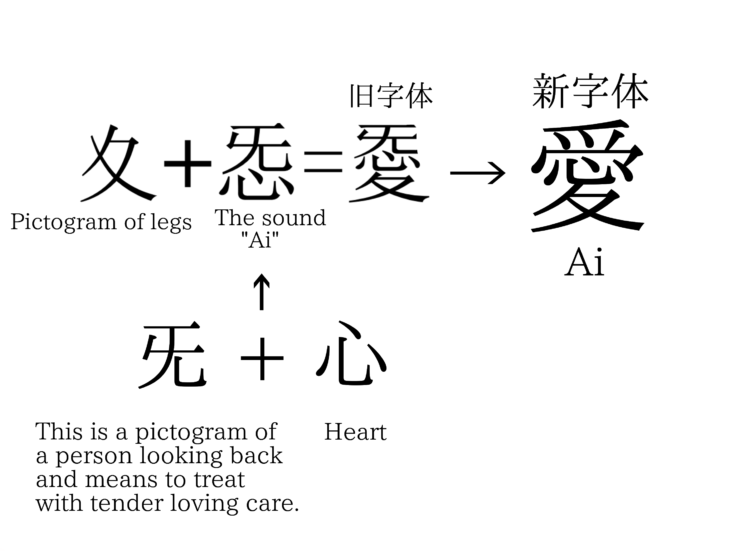Share this link via
Or copy link
One of the best Japanese Kanji dictionary.

There are two Kanji characters for love in Japanese – 愛, and 恋. However, the nuance is quite different. Let’s take a closer look at these characters.
Contents

旧字体(Kyūjitai) are the characters used before the of the Kanji characters, which are called 当用漢字(Tōyōkanji) and 常用漢字(Jōyōkanji), and 新字体 are the characters used after that. The standardization was carried out in 1949, after the World War II.

Let’s see what the Kanji dictionary says.
 : love, affection
: love, affection : affection, compassion, tenderness
: affection, compassion, tenderness : philanthropy
: philanthropy : an enthusiast, a lover[devotee] (of music, literature, sports, etc.)
: an enthusiast, a lover[devotee] (of music, literature, sports, etc.) : habitual smoker
: habitual smoker : antismoker, a person hates to get other’s passive smoke (煙 means “smoke,” and嫌 means “to hate”)
: antismoker, a person hates to get other’s passive smoke (煙 means “smoke,” and嫌 means “to hate”) : a lover, or mistress of a married person
: a lover, or mistress of a married person : friendship, fellowship, fraternity
: friendship, fellowship, fraternity : the affection between married couples
: the affection between married couples : the mutual affection between parent and child (parents and children)
: the mutual affection between parent and child (parents and children) : the love and affection of a family
: the love and affection of a family : in love with each other
: in love with each other : patriotic sentiments
: patriotic sentiments :” Please take good care of yourself.”
:” Please take good care of yourself.” : first love
: first love : a sweetheart, a boyfriend, or a girlfriend
: a sweetheart, a boyfriend, or a girlfriend : disappointed/unrequited love
: disappointed/unrequited love : tragic love
: tragic love : a love letter
: a love letter : to miss
: to miss : romantic love
: romantic love愛 is a more general term to express “love.” 恋 has a nuance that you are longing or having a deep desire for someone or something. It is sometimes related to sexuality.
「恋」is related to the concept of 「切なさ」(setsunasa)  .「切なさ」is kind of a feeling of sadness or miserable that your chest gets tight. You really want to get the thing you are「恋している」, but you know that your wish might not come true, and feel anxious or sad about that.
.「切なさ」is kind of a feeling of sadness or miserable that your chest gets tight. You really want to get the thing you are「恋している」, but you know that your wish might not come true, and feel anxious or sad about that.
You can use 恋 not only for a person but for something you truly love and desire; for example,「私は京都に恋しています」(Watashi wa Kyōyto ni koishite imasu)  means you genuinely love Kyoto and have a strong desire to go there. You feel like your heart is thumping, and your heart skips a beat when you think of it.
means you genuinely love Kyoto and have a strong desire to go there. You feel like your heart is thumping, and your heart skips a beat when you think of it.
 , it is not used in daily conversation so often. First of all, Japanese people, especially men, don’t tell that they love their sweethearts with words. Anyway, you need to convey your love to someone to get into a relationship – then, 「好きです」(sukidesu)
, it is not used in daily conversation so often. First of all, Japanese people, especially men, don’t tell that they love their sweethearts with words. Anyway, you need to convey your love to someone to get into a relationship – then, 「好きです」(sukidesu)  is more likely to be used. 「好き」means “like” or sometimes “love.”
is more likely to be used. 「好き」means “like” or sometimes “love.” , the same word used for confession.
, the same word used for confession. .「大」means big and is an exaggeration for「好き」, so it means “I love you so much!”
.「大」means big and is an exaggeration for「好き」, so it means “I love you so much!”
A couple holding hands in front of the Tokyo Tower
If you walk around Japan, you will notice that almost no one is kissing or hugging each other in front of others. If you flirt in public, you are seen shameful or disgraceful. No one will probably say things like “PDA alert!” or “Get a room!” to you; however, people will give you a cold look. Some couples hold hands outside, but this is relatively accepted in Japanese society.
There are no specific words for calling your lovers or spouses like ”Honey,” “Darling,” or “Sweetheart.” People directly call their names or nicknames to their partners. If the couple has children, many of them call each other ”Father”(「お父さん」’otōsan’  or 「パパ」’papa’)
or 「パパ」’papa’)  , or “Mother”(「お母さん」’okāsan’
, or “Mother”(「お母さん」’okāsan’  or「ママ」’mama’
or「ママ」’mama’  )
)
Japanese men tend not to say, “You’re pretty, you’re beautiful,” or “I love you” to their partners. It seems that they are too shy to say those words.
Maybe it is because of the Japanese culture「以心伝心」(Ishin-denshin)  , which means direct communication from mind to mind without words. Japanese men might be thinking that those words are already conveyed without saying – however, it is very doubtful if their partners are thinking in the same way.
, which means direct communication from mind to mind without words. Japanese men might be thinking that those words are already conveyed without saying – however, it is very doubtful if their partners are thinking in the same way.

以心伝心, heart-to-heart communication
What is Onyomi?
Onyomi, also known as the "Sino-Japanese reading," is one of the two main reading systems for kanji characters in Japanese. It refers to the reading of a kanji character that is derived from the original Chinese pronunciation.
What is Kunyomi?
Kunyomi, also known as the "native Japanese reading," is one of the two main reading systems for kanji characters in Japanese. It refers to the reading of a kanji character that is based on the native Japanese pronunciation. Kunyomi readings are often used when a kanji character stands alone or is followed by hiragana, as in verbs and adjectives. Mastering both kunyomi and onyomi is crucial for understanding and using kanji effectively in the Japanese language.
What is Radical?
A radical, also known as "bushu" in Japanese, is a fundamental component of kanji characters. Radicals are the building blocks of kanji and are used to categorize and organize them in dictionaries. There are 214 traditional radicals, each with its own meaning, which often provides a clue to the meaning of the kanji character it forms.
What is strokes?
Stroke count, or "kakusuu" in Japanese, refers to the number of individual brushstrokes required to write a kanji character. Each kanji has a specific stroke order and stroke count, which are essential for writing the character correctly and legibly. Understanding and following the correct stroke order not only ensures proper balance and aesthetics but also makes writing more efficient and fluid.